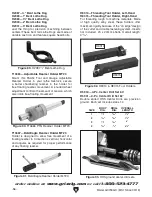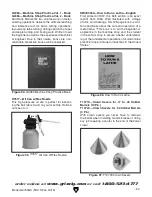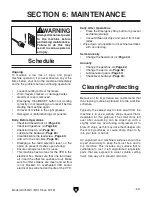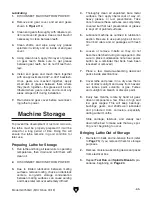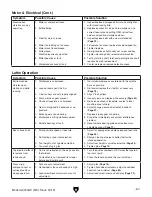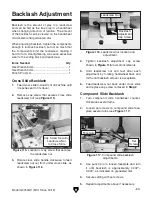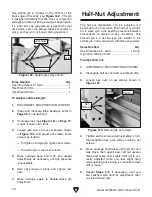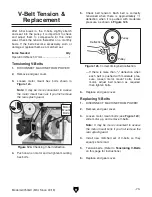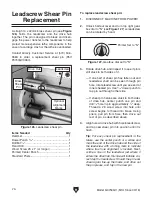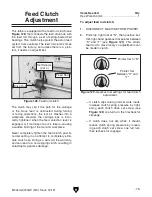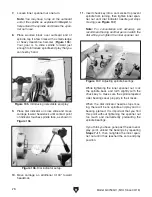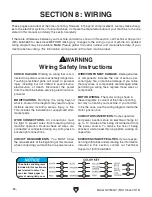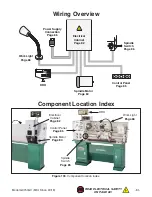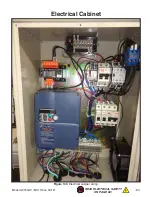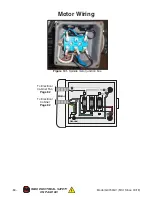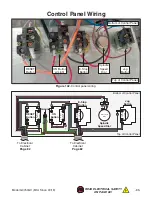
-70-
Model G0750GV (Mfd. Since 03/18)
The goal of adjusting the gib screws is to remove
sloppiness or "play" from the ways without over-
adjusting them to the point where they become
stiff and difficult to move.
In general, loose gibs cause poor finishes and
tool chatter; however, over-tightened gibs cause
premature wear and make it difficult to turn the
handwheels.
Gib Adjustment
Leadscrew End-Play
Adjustment
After a long period of time, you may find that the
leadscrew develops a bit of end play. This lathe
is designed so that play can be removed with a
simple adjustment.
Items Needed
Qty
Hex Wrench 3mm .............................................. 1
Wrench 24mm ................................................... 1
Mineral Spirits .................................... As Needed
NLGI#2 Grease ................................. As Needed
To remove leadscrew end play:
1. DISCONNECT MACHINE FROM POWER!
2. Back out leadscrew set screw approximately
five turns (see
Figure 118).
3. Un-thread leadscrew flange bolt (Figure 118),
and slide bearing cover off end of leadscrew.
4. Clean bearings with minerals spirits, then
dry and repack them with NLGI#2 grease.
Re-install bearing cover.
5. Using left hand, pull leadscrew toward
tailstock. Thread leadscrew flange bolt back
on finger tight with no leadscrew end-play.
6. Hold leadscrew flange bolt with wrench, and
tighten set screw until it is snug at bottom of
bore.
The cross-slide and compound slide on this lathe
each use a long steel wedge called a gib that is
positioned between the component and its dove-
tailed-ways. At the end of each gib is a gib screw,
which moves and holds the gib. Depending upon
which direction the gib moves, the space between
the sliding ways increases or decreases to control
the rigidity of the cross slide and compound slide.
Before adjusting the gibs, loosen the locks for
the device so that the gibs can freely slide during
adjustment, then lubricate the ways.
The gib adjustment process usually requires
some trial and error. Repeat the adjustment pro-
cess as necessary until you find the best balance
between loose and stiff movement. Most machin-
ists find that the ideal gib adjustment is one where
a small amount of drag or resistance is present,
yet the handwheels are still easy to move.
Bearing
Cover
Leadscrew
Flange
Bolt
Leadscrew
Figure 118. Leadscrew end play bearings.
Set
Screw
Electrical Cabinet
Cooling Fan Cleaning
The electrical cabinet contains a variable-fre-
quency drive that generates heat during opera-
tion. Keeping the fan screens clean is critical to
prevent the VFD from overheating and becoming
damaged.
Keep both fan screens brushed clean. Use of
high-pressure air may rip the fan filters. Clean the
screens as required to maintain cabinet cooling.

